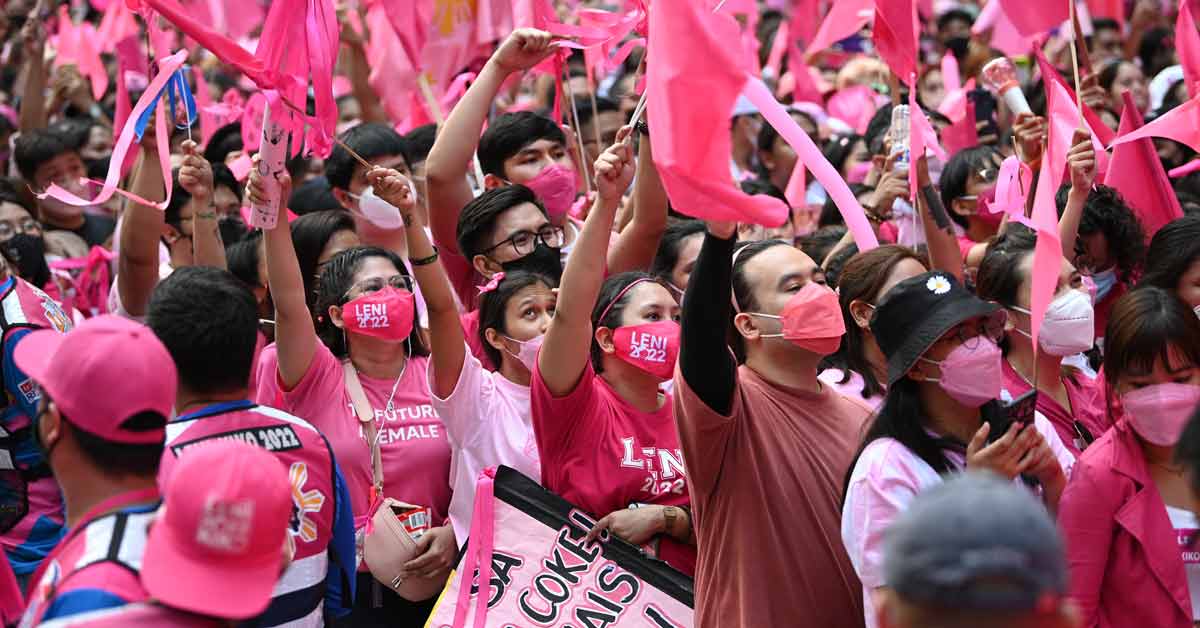As the May 2022 Presidential Election draws near, with the impending change of administration in the Philippines, there have been different views and perspectives on how Philippine foreign policy should adjust to the changes in the strategic environment underpinned by the United States (US)-China geopolitical competition in the Indo-Pacific region and the US-Russia geopolitical tussle in Eastern Europe amid the Ukraine crisis.
Indeed, the rivalry and competition of major powers, more particularly between China and the US, and between Russia and the US, are one of the significant geopolitical concerns of small countries like the Philippines.
For instance, the rise of China and the competing claims of the various claimant-states over the disputed waters of the South China Sea (SCS), seen by many as one of the most critical and central long-term strategic concerns in the Indo-Pacific region, feature prominently among the topics of presidential, vice-presidential and even senatorial debates these days.
Amid the political and geopolitical discourse, one thing is imperative for the next president and his administration to consider, and that’s for the Philippines to adapt and adjust to the changing geostrategic and geopolitical realities and environment of the Indo-Pacific region and beyond while protecting the core national and security interests of the country, and mitigating the country’s sense of vulnerability amid the heightening competition and rivalry between the existing dominant power the US, the rising power in Asia, China, and Russia in Eastern Europe.
Neutrality
Moreover, one of the many perspectives that have gained traction thus far on how the Philippines should position itself and navigate amid the heightening competition, manoeuvres, and rivalry among and between superpowers is the idea that the Philippines should try to insulate itself from the strategic rivalries and competitions between the superpowers.
One possible way is for the Philippines to be completely neutral and non-aligned while pursuing an independent foreign policy as prescribed by the 1987 Constitution. This could be done by downgrading or abrogating the Visiting Forces Agreement (VFA), Enhanced Defense Cooperation Agreement (EDCA), and the Mutual Defense Treaty (MDT).
Such action allows Manila to strike leverage with China because “the apprehension of military encirclement by Washington is a top concern of China in the SCS.
Downgrading the alliance would allow the Philippines to “move towards a position of neutrality,” which suggests “rejecting outright alignment with Washington on the configuration that the country is better off balancing between the United States and China in the pursuit of its national interests.”
But then again, the challenge lies in the fact that the Philippines’ geography dictates that it would be inevitable for the Philippines not to be influenced by major power competition because of its strategic geopolitical location. The Philippines – situated between the SCS and the broader Pacific Ocean – is essentially the grand chessboard of Washington and Beijing.
Diversification
The next administration can further pursue the diversification of the country’s military cooperation with other countries to avoid too much dependency on the US, militarily speaking.
Under the Duterte presidency, the AFP, alongside other security and law enforcement government agencies, have been given top priority, substantial and sizeable importance, focus, and attention than ever before.
It is noteworthy that under the Duterte administration, the dependency on the US in improving and modernizing the AFP has been reduced and lessened to a considerable extent. For instance, there are a lot of improvements in the welfare and capabilities of the AFP. In 2018, Duterte increased the salaries of Filipino soldiers commensurate to their critical role of upholding national integrity and security and maintaining peace and order in the country.
Also, the country’s defense capabilities have been boosted to some extent with the acquisition of two brand new missile frigates – the BRP Jose Rizal and the BRP Antonio Luna – and the purchase of six A-29B “Super Tucano” close-air support aircraft, and 15 “Black Hawk” S-70i helicopters.
Thus far, these modest improvements in the AFP as part of its modernization program has never happened before under previous administration(s) that relied more on the US extension of defense assistance to the country.
Furthermore, Duterte continues to look for alternative options as far as sourcing of military assets is concerned. Purchase of military armament and assets have been diversified and sourced from various countries and not exclusively from the US.
For example, the Philippines has flourishing security ties with South Korea, Japan, Russia, and India. These countries, to some extent, have become major defense suppliers of the Philippines under Duterte’s leadership.
Military Cooperation Vs Military Alliance
Hence, it is time for the Philippines to pursue the diversification of its military cooperation with countries other than the US, the likes of ASEAN member states, China, Russia, India, etc.
There’s a difference between military cooperation and military alliance. A military alliance is a formal agreement between nations concerning national security. A treaty is needed for a military alliance which needs to be ratified by Congress before it could be effective. Also, military alliance purports that in the agreement, countries' parties to the said treaty contribute to the defense of other countries in the event of a military crisis.
Military cooperation is military diplomacy that aims to foster bilateral and regional relations. Military cooperation may include joint military training, joint military exercises, drills, joint patrols, radar inputs, intelligence sharing, exchange visits of military personnel, and exchange of information, which facilitate and build close ties between countries.
Military cooperation is not equivalent to a military alliance or military or political subservience or servility. Instead, it facilitates the groundwork for a contingency of military interoperability between and among nations to a greater extent.
In many ways, military cooperation helps in strengthening strategic security relations and addressing common security concerns between countries forging military cooperation or military diplomacy.
Military cooperation is vital in the process of developing close ties with the military forces of neighbouring countries and much more with the military forces of ASEAN member states to build trust, confidence and enhance collective regional security.
Military cooperation, both in traditional security threats and non-traditional security threats with other countries other than the US, especially with our neighbours, is a crucial peacetime activity as it reinforces the country’s foreign and security policy objectives with the ultimate aim of maintaining peace, establishing mutual trust, developing cooperation and enhancing stability and security in ASEAN and the broader Indo-Pacific region.
Non-Traditional Security (NTS) refers to human security concerns such as climate change, food shortage, resources such as energy, infectious diseases, natural disasters, transnational crime, human and drug trafficking, and mass migration. In contrast, traditional security refers to threats against the essential values of the state, territorial integrity, political sovereignty, and the like.
Forging military cooperation with countries other than the US helps build linkages with other countries, which in many ways helps create an atmosphere of shared and common understanding amid challenges and differences in the ever-changing, ever-challenging, and volatile Indo-Pacific region.
Conclusion
Given the critical role of the executive branch headed by the President as “sole author” of the country’s foreign policy as mandated by the 1987 Constitution, the winner of the 2022 presidential elections will play a decisive role in determining the contours of Philippines-U.S. relations and alliance and the country’s military cooperation with other countries under the watch of the next administration.
The views expressed in this article are the author’s own and do not necessarily reflect those of The ASEAN Post.

